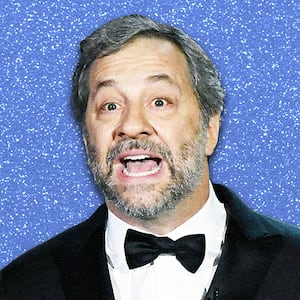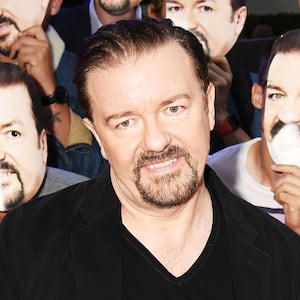It has now been more than 20 years since Stephen Merchant and Ricky Gervais changed TV comedy with the original British version of The Office. Now, after co-starring with Gervais in Extras and creating his own HBO comedy series Hello Ladies, Merchant is back with The Outlaws, a surprisingly intense crime thriller—with plenty of laughs throughout—that co-stars Christopher Walken and just landed on Amazon Prime Video.
In this episode of The Last Laugh podcast, Merchant talks about creating that series with an ex-convict and how they got Walken to paint over an original Banksy in the finale. He also tells stories about the early days of The Office, what he thought about the even more successful American version, his complicated relationship with Gervais, and a lot more.
Merchant explains that surprising viewers with the dramatic tone of The Outlaws was always “part of the intention.” Going all the way back to his very first TV project, with what even he now refers to as “the British version of The Office,” the comedian says, “There was always a whiff of drama. We weren’t always just chasing the laugh, and if a scene needed to end with a beat of emotion or with an awkwardness, we were happy to go there.
“And that’s something that I tried to continue through my career, to not feel the burden of the punchline always,” he continues. “I know that can sometimes sound like just lazy comedy writing, but to me, it’s just not feeling that you have to chase that at every moment.”
The Outlaws centers on seven disparate criminals who are forced to complete a “community payback” sentence together. Merchant’s parents actually worked as supervisors for a similar community service program when he was growing up in Bristol, where the show is set, but he felt he needed the perspective of someone “from the other side of the tracks” to make the show work. He decided to collaborate with Elgin James, the creator of the Sons of Anarchy spinoff Mayans M.C., who was in and out of juvenile hall as a kid before he ended up spending a year in prison later in life on federal attempted extortion charges.
“He brought a certain grittiness and a certain authenticity about the tougher side of life,” Merchant says. “And I was able to still put in a few dick jokes.” He quickly discovered they had a “shared sensibility” despite their “very different backgrounds,” joking, “I’ve done very little prison time.”
The partnership was so successful that BBC Studios, which first took a chance on Merchant and Gervais’ little mockumentary about office life two decades ago, ordered a second season before the first one even premiered.
Below is an edited excerpt from our conversation. You can listen to the whole thing—including how Christopher Walken ended up painting over a real Banksy in ‘The Outlaws,’ what it was like to direct the American version of ‘The Office,’ acting opposite Robert de Niro on ‘Extras,’ and more—by subscribing to The Last Laugh on Apple Podcasts, Spotify, Google, Stitcher, Amazon Music, or wherever you get your podcasts, and be the first to hear new episodes when they are released every Tuesday.
The big debate about The Office in recent years is this question of whether audiences would tolerate a character like David Brent or Michael Scott now, given how politically incorrect and crass they can be. From my perspective, the way it was handled, you knew that he was being politically incorrect and it’s not like the show was saying, “Look at how great this guy is when he says these things.” But how do you think about it?
Well, I think you’re right in the sense that, certainly when we did our version, at the time there was a lot of conversation about political correctness. That was a real buzzword in the discourse here in the U.K. So the idea of what could and couldn’t be said was already a conversation. And so our show was a comment on that and about someone who is trying to adapt to this new reality and isn’t fundamentally able to. There’s a juxtaposition between his innate sensibilities and what he wants to be and how he wants to be perceived. So that was already baked into the DNA of the show. It wasn’t like we just went off and brazenly gave him outrageous things to say without giving it some consideration. It was, in a sense, a satire on that kind of person.
I think the difference now is that even to deal with some of those subjects within a comedy—even if you’re trying to do it from a satirical place or from an observational place—seems to be more dangerous. It’s somehow more sensitive now to go into even the territory that we explored. Even if you’re, as I say, coming from the right place. And I think that’s the big difference now, as soon as you go into mischievous or controversial areas, whether audiences will come with you on that journey or whether there will be too many people that will just be immediately scared or alarmed or offended at the very mention of a word or a subject.
Ricky Gervais has always been very outspoken on these issues and free speech and being able to say whatever you want to say in comedy. Do you feel like you two were always on the same page about those things, or were there ever disagreements about how far to push things on any of the shows that you did?
I’ve always said that I feel Ricky has a little bit more of a punk-rock sensibility than I do. He’s braver in a sense and a little bit more willing to kick at the system than I am. I’d like to be let into the Establishment, please, whereas Ricky’s happier to give the finger to the Establishment. So I agree with him, in the sense that I don’t think there should be any limits to free speech, but I do feel, at least from my perspective creatively, that I need to be able to justify the territory that I go into or that we go into. And so there were probably occasions where we policed ourselves, but I don’t know that it always fell to me. I think it would swing back and forth, really. We made sure there were no rules in the writing room, and sometimes we would come up with an idea that was hysterical to us and then both arrive at the thought that that was probably too much. But in the end, we were not trying to be irresponsible with that show. We felt like we were trying to make a point. So I don’t remember us ever kind of getting into an argument about “we just cannot say that.” I think it was always quite clear to us if it could go in or not.
I don’t know if you’re aware of this, but there are a lot of rumors out there about a falling-out between the two of you, maybe because you haven’t created a show together in several years. Is there any truth to that? Do you still get along well?
I am aware of that, but no, I get on perfectly well with Ricky. I think we just started doing slightly different projects. I returned to stand-up after a long time. And that led to my show, Hello Ladies, which I ended up developing in the U.S. And Ricky had a couple of other projects, one of which was called Derek, which he was doing at the same time I was doing Hello Ladies. So we just sort of got out of sync, really. I’ve had enormous success and fun working with Ricky, but I was starting to enjoy working with different people and different collaborators and finding new territory that I don’t think would necessarily have appealed to Ricky. And so we just sort of drifted apart creatively really, but we certainly never had any big falling-out or big argument or anything like that.
There was a tweet that you sent that appeared to be some sort of swipe at After Life, his show, which everyone was pointing to.
Well, that’s a very unfortunate instance, because I’ve never seen After Life. Ricky and I used to joke that we never watched each other’s stuff really. We just never paid attention to it, even when we were in the midst of things.
It’s quite good.
Oh, I’m sure, I’m sure. But, funny enough, I had been watching Minority Report, and my friend who’s a film critic had put out a thing about movie clichés that you like. And in Minority Report, there’s the cliché of watching videos of your dead child. So I mentioned that as a sort of jokey cliché that I like, and everyone assumed—I guess that happens in Ricky’s show—so they assumed that that was a strange dig at Ricky. But I mean, why on earth would I arbitrarily decide to have an esoteric jab at Ricky? What’s funny about those things is even now, when I give you my explanation, there’s probably part of you that doesn’t believe me. And so it’s impossible. There’s no way I can combat your assumptions. So it is what it is, really. But, you know, I’ve said jokes at Ricky’s expense throughout my career. So why would I suddenly choose this slightly odd, left-field way of having a dig at Ricky? I don’t know what part of me has suggested to people that that’s how I operate.
Listen to the episode now and subscribe to ‘The Last Laugh’ on Apple Podcasts, Spotify, Google, Stitcher, Amazon Music, or wherever you get your podcasts, and be the first to hear new episodes when they are released every Tuesday.



